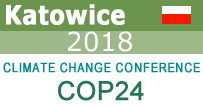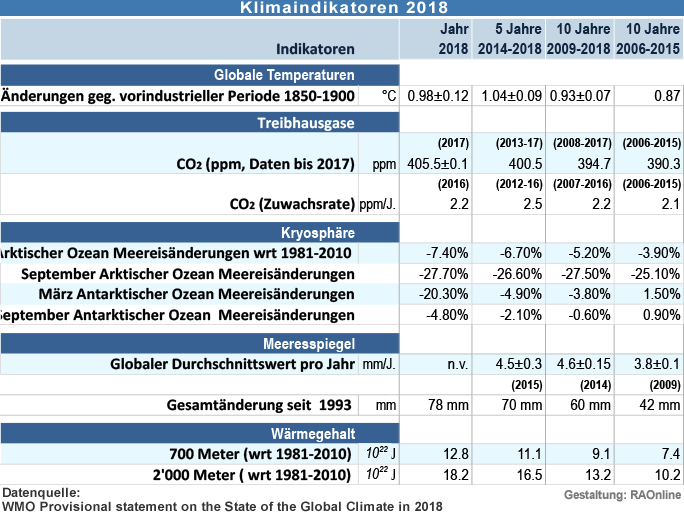| Klimawandel - Climate Change |
 |
Klimakonferenz-COP24 Katowice (Kattowitz) 2018 |
 |
NGOs über COP24 |
 |
COP: Weitere Informationen |
 |
Klimawandel Weitere Informationen |
|
|
| UNO Klimakonferenz COP24 in Katowice/Kattowitz (Polen) 2018 |
 |
| Die Weltklimakonferenz COP24 fand vom 3. bis zum 15. Dezember 2018 in Katowice / Kattowitz in Polen statt |
| Die Weltklimakonferenz COP (UN Framework Convention on Climate Change Conference of the Parties) ist die grösste zwischenstaatliche Konferenz für Klimafragen |
|
The annual United Nations climate change conference has opened with calls for urgent action to prevent runaway climate change and devastating impacts for the planet.
"Science demands a significantly more ambitious response," UN Secretary-General Antonio Guterres told the high-level segment. "According to the World Meteorological Organization, the 20 warmest years on record have been in the past 22 years, with the top four in the past four years. The concentration of carbon dioxide is the highest it has been in 3 million years. Emissions continue to grow," he said.
"The recent special report from the Intergovernmental Panel on Climate Change finds that warming could reach 1.5 degrees as soon as 2030, with devastating impacts. The latest UN Environment Programme Emissions Gap Report tells us that the current Nationally Determined Contributions under the Paris Agreement will lead to global warming of about 3 degrees by the end of the century.
"Furthermore, the majority of countries most responsible for greenhouse gas emissions are behind in their efforts to meet their Paris pledges. So, it is plain we are way off course. We need more action and more ambition," said the UN Secretary-General.
The UN Framework Convention on Climate Change Conference of the Parties, known as COP24, is taking place in the Polish city of Katowice, once one of Europe's coal mining heartlands. Polish President Andrzej Duda addressed the opening ceremony.
The renowned broadcaster Sir David Attenborough announced the UN launch of a new campaign enabling individuals the world over to unite in actions to battle climate change. The new ActNow.bot, is designed to give people the power and knowledge to take personal action against climate change directly on the Facebook Messenger Platform.
"Right now, we are facing a man-made disaster of global scale. Our greatest threat in thousands of years. Climate change. If we don't take action, the collapse of our civilisations and the extinction of much of the natural world is on the horizon," said Sir David Attenborough.
The World Bank Group Chief Executive Officer Kristalina Georgieva announced a major new set of climate targets for 2021-2025, doubling its current 5-year investments to around $200 billion in support for countries to take ambitious climate action. The new plan significantly boosts support for adaptation and resilience, recognizing mounting climate change impacts on lives and livelihoods, especially in the world's poorest countries.
WMO and the World Bank recently signed a framework agreement to strengthen cooperation and scale up support to the countries' efforts to generate and use weather, climate and hydrological information for evidence-based action.The agreement will also facilitate easy access to WMO's expertise by governments implementing projects with World Bank funding.
A top-level WMO delegation is attending COP24 in Katowice, Poland, which has the goal of finalising the implementation guidelines for the Paris Climate Change Agreement.The guidelines will provide clarity on how to implement the landmark agreement fairly and transparently for all, and to ensure that progress on reducing emissions and building resilience can be accurately measured.
The Paris Agreement seeks to keep global mean temperature rise this century well below 2 degrees Celsius above pre-industrial levels and to pursue efforts to limit the temperature increase even further to 1.5 degrees Celsius. It also seeks to strengthen the ability of countries to deal with the impacts of climate change.
Ahead of COP24, WMO issued its provisional statement on the state of the climate in 2018, showing that the global average temperature for the first ten months of the year was nearly 1°C above 1850-1900. This is based on five independently maintained global temperature data sets. The report gives details of climate change indicators, including sea level rise, ocean heat and acidification and sea-ice and glacier melt. It also includes details of impacts of climate change based on contributions from a wide range of United Nations partners.
Levels of heat-trapping greenhouse gases in the atmosphere have reached another new record high, according to the WMO Greenhouse Gas Bulletin. The urgency of actions to reduce greenhouse gas emissions requires more tools at national and sub-national level to support stakeholders in taking effective and efficient actions.
Recognizing this need, WMO has initiated the development of observational based tools that can guide the emissions reduction actions and confirm their results, for instance in the oil and gas sector.
A new Integrated Global Greenhouse Gas Information System (IG3IS) provides the framework for the development and standardization of the observational based tools. IG3IS is implemented by countries on a voluntary basis and will feed into the national emission reporting mechanism at COP. WMO will be showcasing IC3IS in Katowice.
| Quelle: Text UNFCCC, 3 December 2018 |
 |
|






